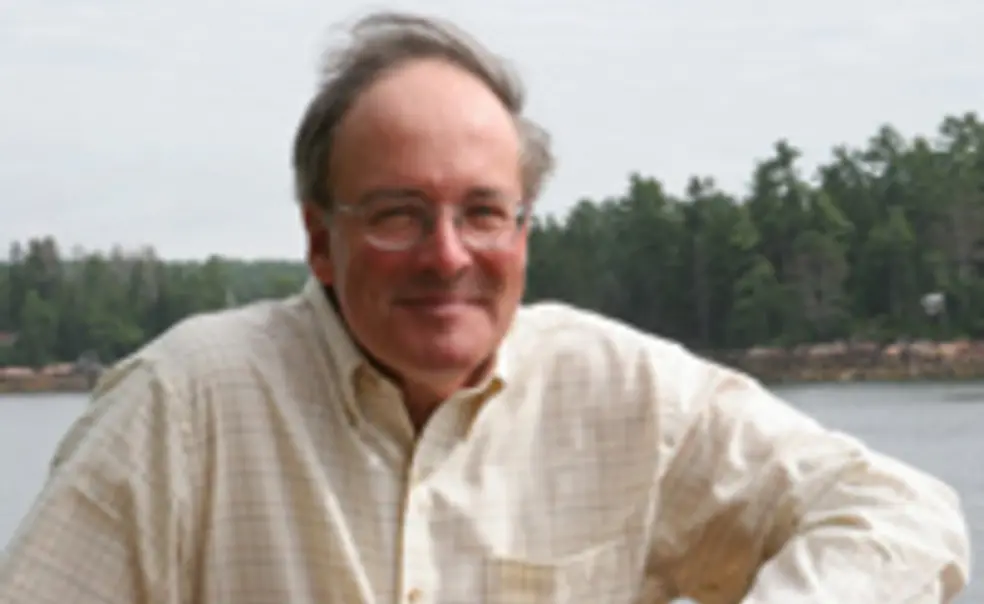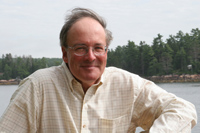Blanchard '74 explores the life of a secluded couple
In 1949 Art and Nan Kellam — an aviation engineer and his wife — decided to leave “civilization” and seek a simpler life, on an uninhabited island off the Maine coast. They bought 550-acre Placentia Island and lived there together until 1985, without electricity. They built their house and would row two miles to Bass Harbor to get supplies and mail. Peter P. Blanchard III ’74 first met Nan in 1987, two years after her husband had died. Blanchard was a volunteer with Maine’s chapter of The Nature Conservancy, to which the Kellams had given their island. (Nan died in 2001.) Blanchard recently wrote We Were An Island: The Maine Life of Art & Nan Kellam (University Press of New England), drawing on Nan’s journal, an unpublished manuscript the couple had written about their adventure, and their letters and correspondence. Blanchard spoke with PAW’s Katherine Federici Greenwood.
You first met Nan in 1987. Can you describe that meeting and what she was like?
I was sort of an emissary of good will [for The Nature Conservancy]. I was taken out there by a lobsterman who regularly helped Nan do chores after her husband died. She was living there by herself. I went out and had every intention to impress her. I carried what I thought was her favorite desert, strawberry ice cream. Unfortunately it had been placed next to the engine of the lobster boat. The ice cream had turned into a melted soup so when I opened the door the ice cream slipped from me and fell quite a bit on her and down the steps to the wonderful footprints the two had left in cement at the bottom of the stairwell. Not a way to start a friendship. … I [read] her actual journal entry for that day. She said, “I want to make sure the lobsterman sees this fellow off the island.” But then we became good friends.
… She had a real resilience about her, even though these were obviously tough times. Her husband had passed away two years before. Their life had been so entwined and so deeply lived together, and then all of a sudden one half of it is not there.
Why did the Kellams want to buy the island and live in somewhat isolation away from the comforts of “civilization”?
Theories abounded about why – and folks didn’t understand and thought this was a little strange although their lifestyle was more typical of the 19th century. … Theories ranged from escaping from some terrible accident or injury, psychological depression perhaps, or most prevalent of all theories was that he was involved in the Manhattan Project and was escaping from a sense of guilt. But none of these are true. He worked for the aviation industry for Lockheed designing fighter jets during World War II, but he was not involved in the Manhattan Project.
The wonderful thing that comes out of the journal and other writings is that they were planning this all along. Even at the time of their marriage [in 1935] they had a vision of a place they could escape to [where] they could live life fully without all the constraints and impediments that modern civilization throws at folks. This is a very positive decision. I looked carefully for any signs of retreat, or something that they were trying to get away from. It is all positive. It’s basically the theory that being on your own and resilient you can have a better life and cut away the nonessentials.
How did they earn money to buy food and supplies?
There’s a little mystery there. … When they sold their property in California before coming east to their island, the cost of the sale was almost equivalent to the purchase price of the island. They were never very well off. He probably had some savings from his work. There was some parental help we understand. There may have been some bank accounts I’m not aware of. This man was not a wealthy person just deciding to buy up a large landscape and live on it. They had an understanding that they were going to have to be frugal and careful.
What was an average day like for them?
A typical day in the summer, early on when they were working on their home, there would have been a whole lot devoted to the construction of the house, clearing a bit of land, and they developed some gardens. There were some wonderful rituals in every day … no matter what they were doing, harvesting wood for fire or planting … or just going down to check on who was landing on the island. Their various activities were always punctuated by reading spells. They read to each other very regularly. They also read alone. They also were very interested in writing. Their hope was to write not only their own story but for Art, he was very interested in fiction, so he wrote a number of drafts of different stories. They had this dream of being writers out there. They enjoyed music, they had a radio and Victrola. They rowed across [to the mainland]. They kept a little car in Bass Harbor. They actually had trips away from the island but they were fairly brief.
They weren’t really hermits – they had a wide network of mainland friends and visitors – but they were very protective of their privacy.
Absolutely. … If you got to know them and you became welcome, they were really delighted to have folks by. It was kind of this ironic thing — here was this search for isolation and independence but at the same time a recognition that human ties are necessary and wonderful. … I think there were certain seasons of the year and times of weather that they were truly isolated. And they looked forward to these and write about them with great relish. For example, “There’s a plan to go across to Bass Harbor. Thick fog comes up or heavy storm.” And there’s almost a childish delight like school’s cancelled. … [They loved] those magical moments when the drawbridge was up. I think the appeal of this is not just this quirky, idiosyncratic couple, but they … touch upon a strain of feeling many of us share, that in this world that is so overwhelming, complex, and highly technological, isn’t it a wonderful dream to have a kingdom of your own and say, “OK, great that’s all going on, but here I am and it’s the world I understand and it’s all very peaceful.” I think it’s kind of an inner dream we all have.
Interview has been condensed.














No responses yet